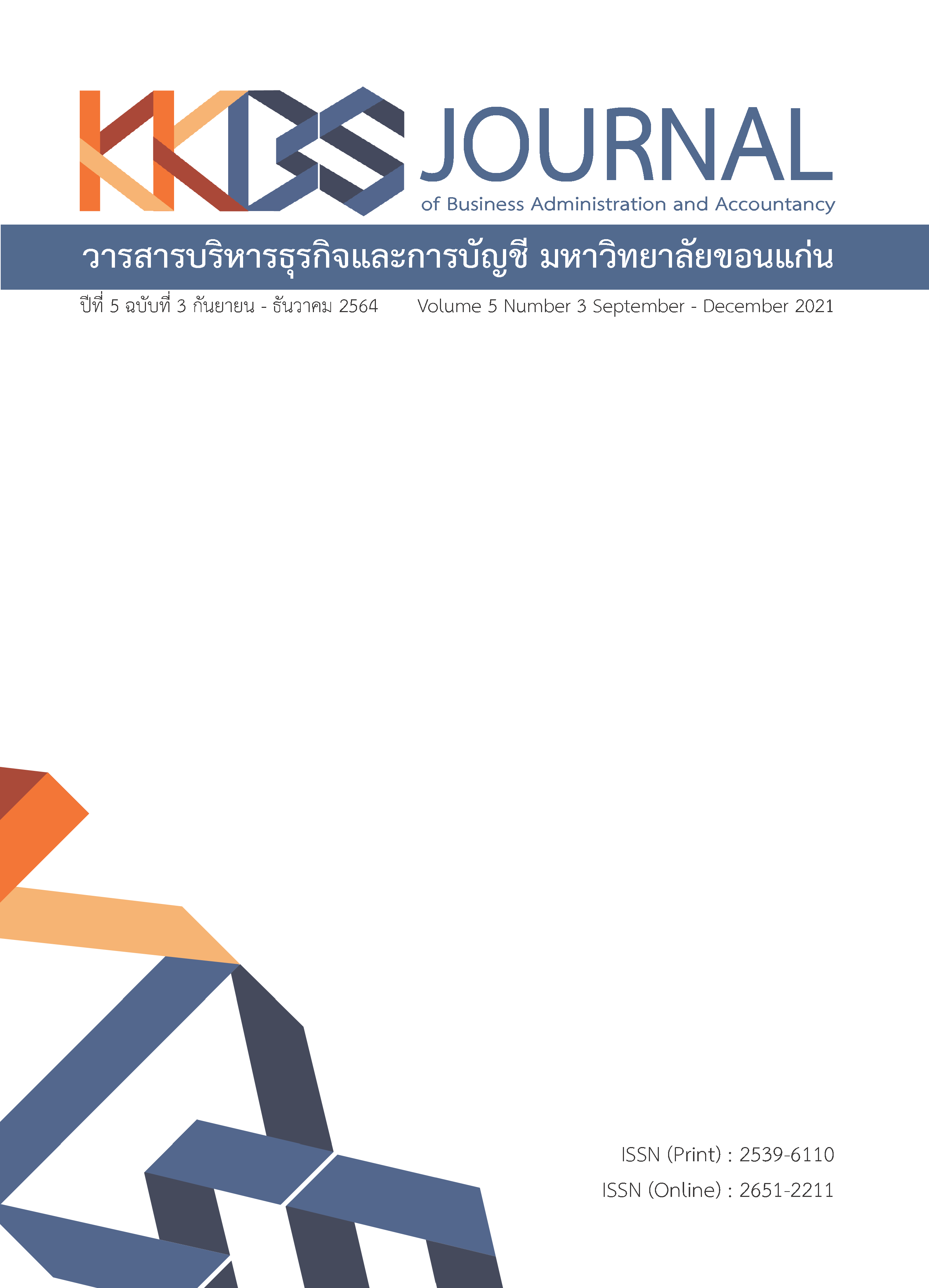Factors Affecting Attendees Loyalty and Perceived Authenticity of Sithan Festival, Khon Kaen
Main Article Content
Abstract
The aim of this research is to examine the factors affecting perceived authenticity and attendee’s loyalty of Sithan Festival Khon Kaen. A questionnaire with self-administrative approach was used to collect data from 150 attendees who had experienced in the festival. Multiple regression analysis was used to test the proposed hypotheses. The results found that festival activities, 2) festival information services 3) festival facilities, and 4) the uniqueness of festival had significant and positive impact on the perceived authenticity of the Sithan Festival Moreover, the authentic recognition positively and significantly impact attendees’ loyalty. Therefore, event organizers should pay more attention to these various factors affecting the perception which to increase authentic satisfaction of the festival and sustain attendees’ loyalty by using social media advocacy or interaction with peers. The results of this study also bolster the economic benefits to Khon Kaen and create various job to people in the community.
Article Details
The articles published in the journals are the authors' opinions, not the opinion of the editorial team or administrative staff. The articles published is copyright of the Journal of Business Administration and Accounting, Khon Kaen University.
References
Akhoondnejad, A. (2016). Tourist loyalty to a local cultural event: The case of Turkmen handicrafts festival. Tourism Management, 52(C), 468-477.
Bladen, C., Kennell, J., Abson, E. & Wilde, N. (2012). Events management: An introduction. London: Routledge.
Castéran, H. & Roederer, C. (2013). Does authenticity really affect behavior? The case of the Strasbourg Christmas Market. Tourism Management, 36(C), 153-163.
DiPietro, R.B. & Levitt, J. (2019). Restaurant authenticity: factors that influence perception, satisfaction and return intentions at regional American-style restaurants. International Journal of Hospitality & Tourism Administration, 20(1), 101-127.
Esanbiz. (2020). Sithan KKU Festival Esanbiz company. Retrieved August 20, 2019, from
Getz, D. & Page, S. J. (2016). Progress and prospects for event tourism research. Tourism Management, 52, 593-631.
Green, S.B. (1991). How many subjects does it take to do a regression analysis. Multivariate Behavioral Research, 26(3), 499-510.
Hair et al. (2006). Multivariate data analysis. 6th ed. Upper Saddle River, NJ.: Pearson Prentice Hall.
Khon Kaen University. (2020). Sithan KKU Festival. Retrieved August 20, 2019, from
https://eng.kku.ac.th/sithankkufestival
Leckie, C., Nyadzayo, M.W. & Johnson, L.W. (2016). Antecedents of consumer brand engagement and brand loyalty. Journal of Marketing Management, 32(5-6), 558-578.
Lee, T.H. & Chang, P.-S. (2017). Examining the relationships among festivalscape, experiences, and identity: evidence from two Taiwanese aboriginal festivals. Leisure Studies, 36(4), 453-467.
Mahittivanicha, N. (2020). Statistics and social media using behaviour in 2020. Retrieved August 20, 2019 from https://www.twfdigital.com/blog/2020/02/global-social-media-usage-stats-q1-2020/ (In Thai)
Ministry of Culture. (2014). Loy Kratong festival. Bangkok: Department of Cultural Promotion.
Novello, S. & Fernandez, P.M. (2016). The influence of event authenticity and quality attributes on behavioral intentions. Journal of Hospitality & Tourism Research, 40(6), 685-714.
Phonphithak, K. et al.(2020). The influence of tourism attribute on tourist's perceived value of the tourism community-based in The Khong River Basin, Nong Kai Province. KKBS Journal of Business Administration and Accountancy, 4(1), 1-20. (In Thai)
Robinson, R.N. & Clifford, C. (2012). Authenticity and festival foodservice experiences. Annals of Tourism Research, 39(2), 571-600.
Shone, A. & Parry, B. (2004). Event management a practical handbook. 2nd ed. London: Taylor & Francis.
Tanford, S. & Jung, S. (2017). Festival attributes and perceptions: A meta-analysis of relationships with satisfaction and loyalty. Tourism Management, 61, 209-220.
Vichitrboonyaruk, P. (2014). Social media: Future media. Executive Journal, 31(4), 99-103. (In Thai)
Woosnam, K.M. & Aleshinloye, K.D. (2018). Residents’ emotional solidarity with tourists: Explaining perceived impacts of a cultural heritage festival. Journal of Hospitality & Tourism Research, 42(4), 587-605.
Wu, C.-W. (2016). Destination loyalty modeling of the global tourism. Journal of Business Research, 69(6), 2213-2219.
Yi, X., Fu, X., Yu, L. & Jiang, L. (2018). Authenticity and loyalty at heritage sites: The moderation effect of postmodern authenticity. Tourism Management, 67, 411-424.
Yoon, Y. & Uysal, M. (2005). An examination of the effects of motivation and satisfaction on destination loyalty: a structural model. Tourism Management, 26(1), 45-56.
Zhang, T., Chen, J. & Hu, B. (2019). Authenticity, quality, and loyalty: Local food and sustainable tourism experience. Sustainability, 11(12), 3437.
Zorilla, J.J. (2000). Authenticity in the context of ethnic tourism: the local perspective. Canada: Travel and Tourism Research Association.


